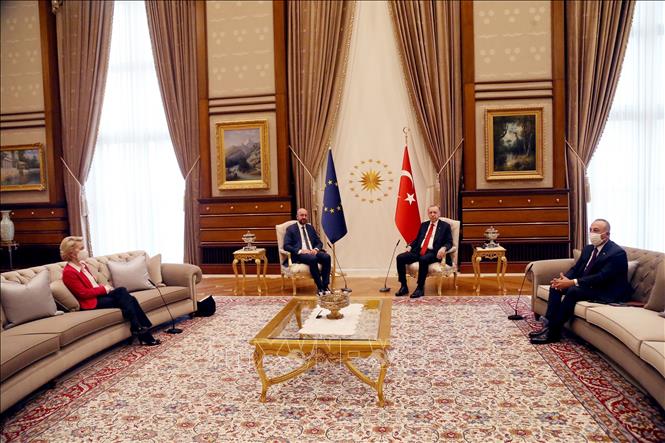EU bans Russian oil: both sides lose

Oil storage tanks at Hungary’s Duna Refinery, which receives Russian crude through the Druzhba pipeline – Photo: AFP
On May 30, the EU agreed on a sixth package of sanctions against Russia, including an agreement to ban most oil imports from Russia. “This sanctions will immediately affect 75% of oil imports from Russia,” European Council President Charles Michel wrote on Twitter after the summit of the European Council in Brussels (Belgium) on the same day.
EU exerts “maximum pressure”
The ban will apply to Russian oil transported by sea, which accounts for about two-thirds of Russia’s oil imports into Europe. In addition, the commitment of Germany and Poland to stop importing oil through the northern part of the Druzhba pipeline is expected to bring the amount of Russian oil banned by the EU to 90% by the end of the year.
The EU will still temporarily waive the ban on oil shipped from Russia by pipeline. This is to give Hungary, Slovakia and the Czech Republic more time to prepare to completely stop importing Russian oil.
The EU’s achievement of the above agreement after weeks of difficult negotiations has resolved the bloc’s stalemate in imposing the toughest sanctions on Russia for its military campaign in Ukraine. Hungary previously complained that the EU had not taken into account its energy security needs because Budapest was dependent on Russia’s Druzhba oil pipeline.
In addition to banning the import of most Russian oil, the EU also agreed to remove Sberbank (Russia’s largest bank) from the SWIFT international payment system, impose a ban on three Russian state broadcasters, and impose additional sanctions on foreign companies. individuals involved in the military campaign in Ukraine.
According to Tass news agency, before the EU’s move, on May 31, Mikhail Ulyanov, Russia’s permanent representative to international organizations based in Vienna (Austria), said that Russia would look for oil importers. other alternative.

The main oil pipelines between Russia and Europe Source: S&P Global Platts, BBC – Data: BAO ANH – Graphics: TAN DAT
Add fuel to the fire
If the EU’s unanimous adoption of an agreement to ban the import of most Russian oil from the EU is considered a “remarkable achievement” by Mr. Charles Michel, it will further strain Russian-Western relations and the Russia-Russia conflict – Ukraine is more difficult to find a way out.
This could also negatively affect efforts to deal with other crises, such as the food crisis, especially when Russia is showing goodwill in resolving these issues. Recently, Russian President Vladimir Putin has repeatedly said that Moscow is ready to facilitate grain exports from Ukrainian ports, and Russia is ready to increase exports of agricultural products and fertilizers if sanctions imposed on Moscow are lifted. .
Now Russia has to find other oil importers, and the EU also has to find alternative sources. In the immediate future, European Commission President Ursula von der Leyen said the EU had agreed to “massive investments in renewable energy” to offset the cuts in Russian oil.
The EU’s ban on imports of most Russian oil could also have a significant impact on the bloc’s competitiveness in the oil market. Refineries connected to the pipeline from Russia enjoy a price advantage. Russia’s Urals crude oil is trading at about $93 per barrel, lower than the price of about $120 per barrel of Brent crude (considered the benchmark for world oil prices). About 36% of EU oil imports come from Russia.
The EU ban on Russian oil will add to the pressure on already tense energy markets. Energy prices have skyrocketed over the past year, contributing to hot inflation in many countries. Meanwhile, the Organization of the Petroleum Exporting Countries and its partners (OPEC+) is expected to stick to its original plan of only increasing oil production to 432,000 bpd in July.
“Adding a ban on sea-delivered Russian crude will tighten already strained supplies amid increased demand as the peak US car travel season begins,” said Avtar Sandu, managing director. commodities at the Philip Nova trading platform in Singapore, said.
Oil prices rise later EU agreement
According to CNBC, on May 31, oil prices jumped after EU leaders reached an agreement to ban most imports of Russian oil.
U.S. light sweet crude (WTI) for July delivery rose 3.7% to $119.3 a barrel, while Brent futures rose 1.9% to $124 a barrel. Contracts for August delivery also traded higher: WTI crude rose 3.8% to $116.50 a barrel and Brent crude rose 2.1% to $120 a barrel.
at Blogtuan.info – Source: tuoitre.vn – Read the original article here



